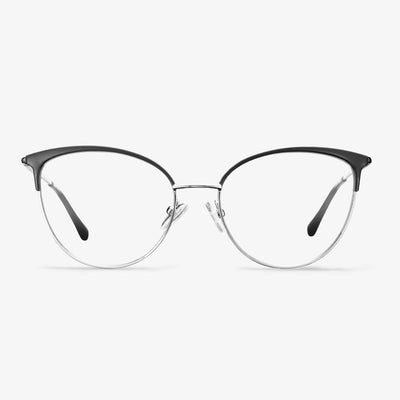Design principle of progressive multifocal lens
For the same piece of the lens, the top is used to see far, the bottom is used to see close. The upper and lower degrees are different.
There is not a sudden change in the distance degree fixed above the lens to the near degree fixed below the lens, but a gradual transition between the two through gradual changes in refractive power, which has special benefits over common bifocals or trifocal lenses.
What is blue light?
To prevent blue light, we must first understand what blue light is. The visible light with a wavelength range of 400-500 nanometers is called blue light. The light sources used in daily LED lighting and display products, including mobile phones, flat panels, and TVs, are mostly LED light sources excited by blue light. However, not all blue light is harmful to the human body. The human eye has an extremely low tolerance to blue light radiation in the 400-440 nanometer range. When the light intensity enters this threshold, photochemical damage is likely to occur. However, blue light radiation in the range of 459-490 nanometers is essential for regulating the human body's circadian rhythm and can affect the secretion of human melatonin, which in turn has an impact on the body's biological clock, alertness, and mood.
Scientifically effective anti-blue light lenses must not only block harmful blue light but also cannot filter beneficial blue light. Most of the ineffective anti-blue light products on the market currently have two types of problems. One is that there is almost no protective effect on the blue light in the vulnerable zone of the human eye. The other is excessive protection, shielding the blue light spectrum in the beneficial band so that the blue light that is beneficial for physiological adjustment cannot enter the human eye. At the same time, the color of the lens is yellow, which is prone to color shift, aggravating visual fatigue, and even inducing the risk of myopia.
Optical Stores Provide Free After-sales Services
They help check eyesight regularly and check eyesight every six months. They help replace accessories, including all kinds of screws, nose pads, temple tips, protective film, etc. The glasses frame can be repaired and made adjustment, with lens ultrasonic cleaning. They help popularization of science, such as consultation on optical problems in ophthalmology, distribution of eye care manuals, and eye charts. Glasses can be repaired (replaced) free of charge after accidental damage. For consumers, it is undoubtedly a good thing, especially for student consumer groups. Because the students are active, frequently use glasses, and easily have other wear and tear problems.
Eyewear stores are close to consumers.
Location is a very critical factor. A reason why customers can walk into your store is that if it is convenient to go to your store. If there are two stores of the same size, your store is in front of the school gate and the other one is 500 meters away from the school, then your store will definitely attract more customers than the one 500 meters away.
Driving Glasses - KoalaEye
The koala eye driving glasses are stylish, and the material is flexible and elastic. The lens arc fits the face line, which has a very good sense of comfort and balance. Imaging sense is very good, and the color is real and clear. It can effectively relieve eyeglasses eyestrain. Also in the market with excellent quality and simple fashion design, it is loved by the public.
The best frame is the one that suits you.
You can choose the full-frame, because the edge of the lens is relatively thick, which can block the thickness of the edge, so it is suitable for high myopia to choose. They can choose a smaller frame. The size of the eyeglass frame should match the pupil distance so that the edge thickness of the lens is thinner and they are more comfortable to wear. The size of the frame should be proportional to the size of the face. The upper edge of the frame should not be higher than the eyebrow and the eyebrow should not be visible in the lenses. The shape of the frame should match the face shape and skin tone to meet aesthetic requirements. Everyone's face size is different, so the smaller the frame is, the better, based on what fits you and what you like.
Advantages of progressive lenses
1. The appearance of the lens is like a single vision lens, and the dividing line of the degree change cannot be seen. Not only is the appearance beautiful, but more importantly, it protects the age privacy of the wearer. There is no need to worry about leaking the age secret due to wearing glasses.(https://www.koalaeye.com/collections/progressive-glasses)
2. Since the change of lens power is gradual, there will be no image jump. It is comfortable to wear and easy to adapt.
3. Because the degree is gradual, the replacement of the adjustment effect is gradually increased according to the shortening of the short distance. There is no adjustment fluctuation, and it is not easy to cause visual fatigue.
4. Clear vision can be obtained at all distances in the visual range. A pair of glasses meet the use of long-distance, near use, and various distances in between. It is especially good for teachers, doctors, music workers, and computer operators because these people not only need to see far and near objects clearly, but most of the time they also need to be able to see objects at intermediate distances such as blackboards, piano scores, and computer screens. This is not possible with lenses other than progressive lenses.
5. At present, both internal and external ophthalmologists agree that young people should wear low-degree convex lenses when reading and writing to reduce near-use adjustment, thereby alleviating or preventing the occurrence and development of myopia. This gives the progressive multifocal lens a new meaning and mission. Physiology found that excessive use of the eyeball adjustment function can form 'accommodative spasm' or pseudo myopia. Continued development can produce longitudinal eye axis elongation and induce 'true myopia' or axial myopia. The external luminosity of the progressive lens can be artificially added to the progressive luminosity. The upper is used for looking far, and the below is used for looking near, which makes the eyeball relax and over-adjust. The ever-changing luminosity of the lens replaces the 'accommodative power' that should have been activated, blocking the vicious circle of adjusting the eye axis elongation, making the eye not easy to fatigue, and slowing the development of myopia.











































